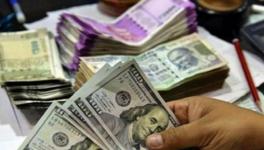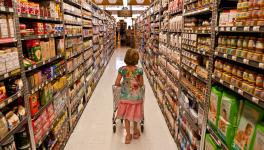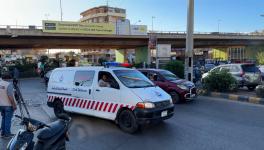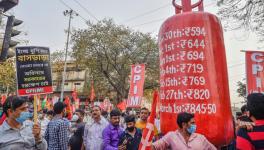Lebanon's Middle Class Vanishes as Economy Collapses
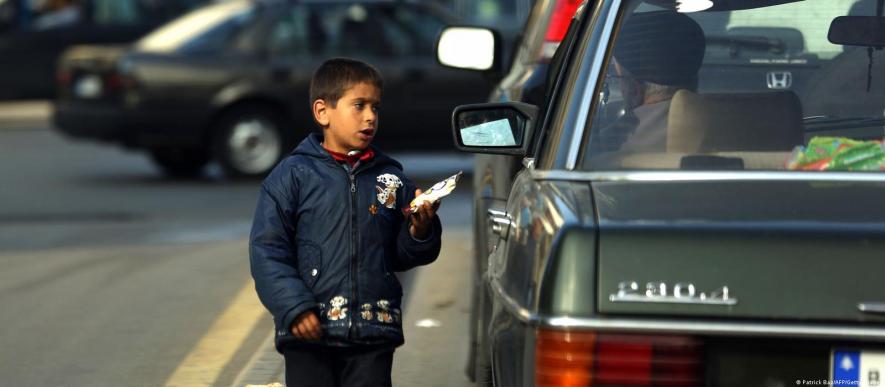
Lebanon's capital Beirut has turned into a city of contrasts. Expensive cars park before popular restaurants and bars, while people of all ages rummage through bins for something edible.
"Also, more and more people are begging in the streets, mainly children but also elderly people," Anna Fleischer, head of the German Heinrich Böll Foundation's office in Beirut, told DW. While it is hard to tell the nationality, "it can be assumed that there are many Syrian refugees, but also Lebanese," she added.
Years of political instability in combination with an ongoing economic crisis — exacerbated by the COVID-19 pandemic and the Port of Beirut blast in August 2020 — have brought the country close to collapse.
Lebanon ranks not only "among the most severe crises globally since the mid-19th century," according to the World Bank, but it is also likely that "an unprecedented institutional vacuum will further delay any agreement on crisis resolution and critical reform ratification, deepening the woes of the Lebanese people," the World Bank report says.
Vanishing middle class, rising hunger
Following years of massive economic contraction, in combination with a 95% devalution of its currency, the Lebanese middle class has practically vanished. In March 2020, the World Bank devalued Lebanon to a lower-middle income country.
"A person that is earning 1,500,000 Lebanese pounds used to have an equivalent of $1,000 before the crisis, and now it is equivalent to less than $200," Hussein Cheaito, a development economist at The Policy Initiative, a Beirut-based research center, told DW.
In a recent publication on rising hunger and poverty in Lebanonby Human Rights Watch (HRW), Lena Simet stated that "millions of people in Lebanon have been pushed into poverty and have cut back on food." The senior economic justice researcher at HRW pointed to worrying trends of food insecurity in the lowest bracket of earners.
![]()

More and more people find it hard to make ends meet and have to skip mealsImage: JOSEPH EID/AFP
Similarly, a September report on food insecurity in the Middle East by the indepedent research network Arab Barometer found that nearly half of all citizens in Lebanon stated that they ran out of food before they had money to buy more.
Extreme wealth inequality
Meanwhile, there are no indications for change, and the tax system is not helping the overall situation in Lebanon.
"The taxation system in Lebanon is highly regressive, which means that there is no wealth tax code, and corporate taxes are amongst the lowest in the world compared to all OECD averages," Hussein Cheaito told DW.
The beneficiaries of the taxation system are those of the "political class and their business connections, because this 1% owns more than 70% of the national income," Cheaito said. This, in turn, leaves a very small percentage of wealth to the rest of the society," he claims.
Furthermore, those who earn their wages in Lebanese pounds, or receive support via charity organizations, suffer from another disadvantage. Banks only offer limited cash withdrawals in US dollars to those who have US dollars in their accounts.
![]()

Some Lebanese took to the streets in August 2022 to denounce the depreciation of the Lebanese currency due to the country's political and economic crisis.Image: Dario Sabaghi/DW
Also, for the past 20 years, Lebanese banks have kept the pegged exchange rate of $1 to 1,500 Lebanese pounds. This, however, will be updated to $1 to 15,000 pounds on February 1. Even though this is 10 times more than before, it is still far from the actually used exchange rate on the black market. The current rate ist 50,000 pounds to the dollar.
On the other hand, for those, who work for international companies or have other means of accessing dollars, life has become relatively cheap, which also explains the thriving cocktail bars and fully booked restaurants.
Dollarization of the economy
"The reality today is that one of the most important sources of income for families are remittances from family members who live abroad," Lynn Zovighian, the co-founder and managing director of The Zovighian Partnership, a family-owned social investment platform that develops research-led socio-economic interventions, told DW.
"The collapsed private sector, and expected contraction of the public sector, is driving rising unemployment numbers," she said, adding that "Lebanon is also going through a de facto dollarization of its economy, but not by law or policy. This is happening with no price controls or penalties against financial abuse," the Beirut-based Zovighian said.
![]()

Fuel shortages and soaring prices make a full tank of gas a luxury only few can afford.Image: Mohamed Azakir/REUTERS
Meanwhile, talks between the Lebanese government and the International Monetary Fund (IMF) have led to a staff-level agreement for a program worth about $3 billion over the next 46 months. However, a financial recovery plan to protect the most vulnerable in society, was not included.
"Three billion dollars will be barely enough to get the country back on its feet, given the size of the losses in the financial sector, which are at least $70 billion," Chaeito said.
Moreover, the IMF agreement highlighted that, given the weak state of the Lebanese government and the public sector, Lebanon should focus on state-owned enterprises and the privatization of social and public services, Chaeito told DW.
Macro-economic stabilization
"What are the guarantees that private companies won't actually engage in price hikes and further inflation, which we've seen in Latin America? This could mean that only the ultra-rich will be able to access services," the analyst said.
He regards macroeconomic stabilization as the only solution to save the country from collapse and with it, the majority of the population.
"I refer to the redistribution of losses in the financial sector, ensuring that we have a clear financial recovery plan that primarily protects the smallest of depositors and people who have a middle or low income," Hussein Chaeito said, adding that "their wealth has to be recapitalized, without this it will be impossible to really see the income gap being reduced."
Mohammed Chreyteh in Beirut contributed to this article.
Edited by: Nicole Goebel
Get the latest reports & analysis with people's perspective on Protests, movements & deep analytical videos, discussions of the current affairs in your Telegram app. Subscribe to NewsClick's Telegram channel & get Real-Time updates on stories, as they get published on our website.









